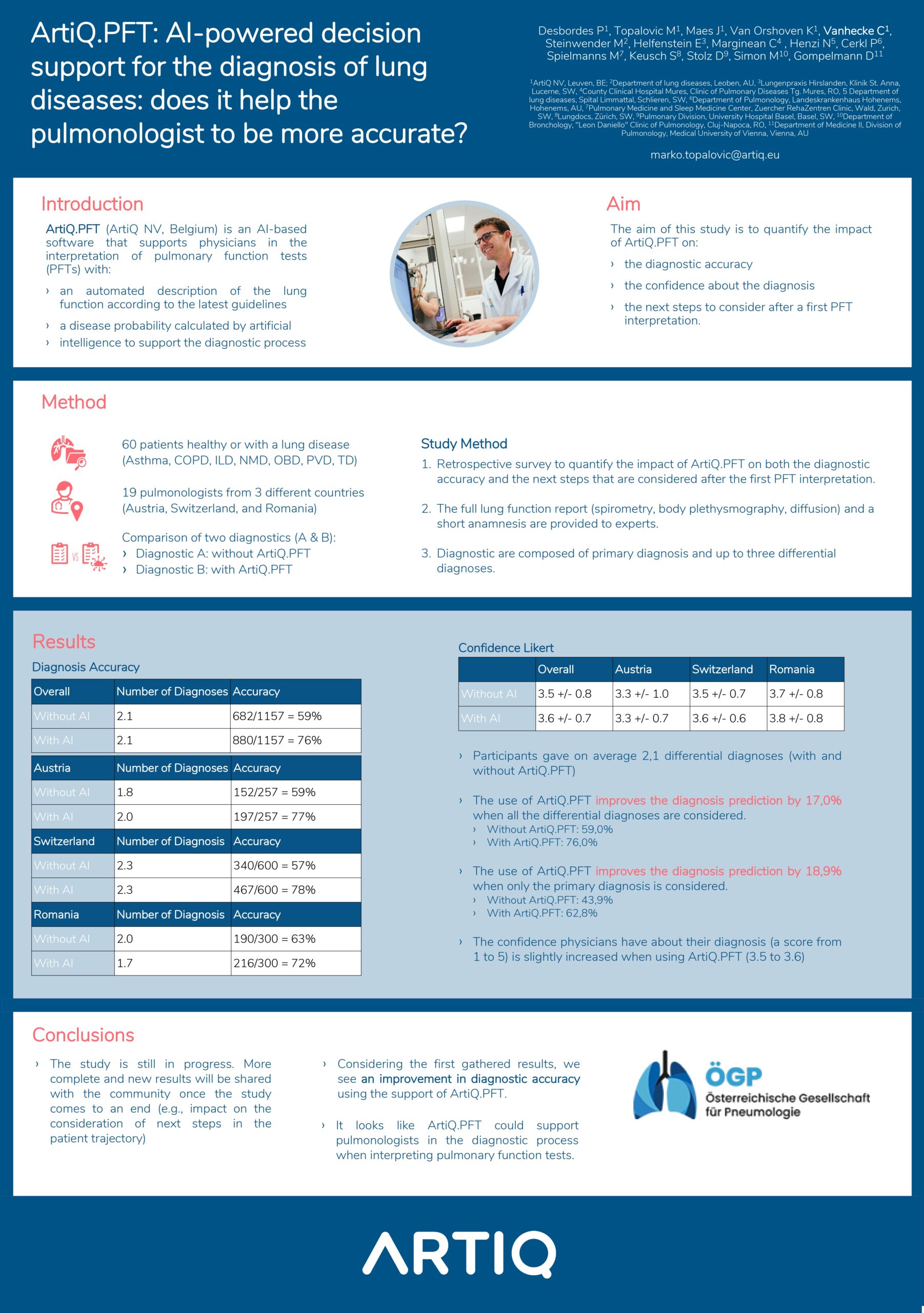ArtiQ.PFT: AI-powered decision support for the diagnosis of lung diseases: does it help the pulmonologist to be more accurate?

Background
ArtiQ.PFT (ArtiQ NV, Belgium) is an Artificial Intelligence (AI) based software that helps physicians in the interpretation of pulmonary function tests (PFTs). It provides an automated description of the lung function according to the latest guidelines and uses AI to calculate disease probabilities to support the diagnostic process.
Methods
A retrospective survey is currently in progress quantifying the impact of ArtiQ.PFT on both the diagnostic accuracy and the next steps that are considered for such a patient. 60 cases (Healthy, Asthma, COPD, ILD, NMD, OBD, PVD, TD) are presented to 19 pulmonologists from 3 different
countries (Austria, Switzerland, and Romania). For each case, the full lung function report (spirometry, body plethysmography, diffusion) and a short anamnesis are provided. Pulmonologists provide a primary and up to three differential diagnoses per patient. This step is performed once without and
once with the support of ArtiQ.PFT.
Results
Our preliminary results demonstrate that participants gave on average 2.1 diagnoses and this number was similar whether they were supported by AI or not. For this number of considered diagnoses the use of AI improves the diagnosis prediction by 17.0% (59.0% versus 76.0%). When looking only at the primary diagnosis, a similar observation can be done: the use of AI improves the detection by 18.9% (43.9% versus 62.8%). Finally, the confidence physicians have about their diagnosis (a score from 1 to 5) is slightly increased when using ArtiQ.PFT (3.5 to 3.6).
Conclusions
This survey is still in progress and more complete and new results will be shared with the community (e.g., impact on the consideration of next steps in the patient trajectory). These intermediate results already indicate that AI (ArtiQ.PFT) could support pulmonologists in the diagnostic process when interpreting PFTs.
Authors
Desbordes Paul1, Maes Julie1, Van Orshoven Karolien1, Vanhecke Camille1, Markus Steinwender2, Erich Helfenstein3, Corina Marginean4 , Nicolas Henzi5, Peter Cerkl6, Marc Spielmanns7, Stephan Keusch8, Daiana Stolz9, Marioara Simon10, Daniela Gompelmann11
1 ArtiQ NV, Leuven, BE
2 Department of lung diseases, Leoben, AU
3 Lungenpraxis Hirslanden, Klinik St. Anna, Lucerne, SW
4 County Clinical Hospital Mures, Clinic of Pulmonary Diseases Tg. Mures, RO
5 Department of lung diseases, Spital Limmattal, Schlieren, SW
6 Department of Pulmonology, Landeskrankenhaus Hohenems, Hohenems, AU
7 Pulmonary Medicine and Sleep Medicine Center, Zuercher RehaZentren Clinic, Wald, Zurich, SW
8 Lungdocs, Zürich, SW
9 Pulmonary Division, University Hospital Basel, Basel, SW
10 Department of Bronchology, “Leon Daniello” Clinic of Pulmonology, Cluj-Napoca, RO
11 Department of Medicine II, Division of Pulmonology, Medical University of Vienna, Vienna, AU
